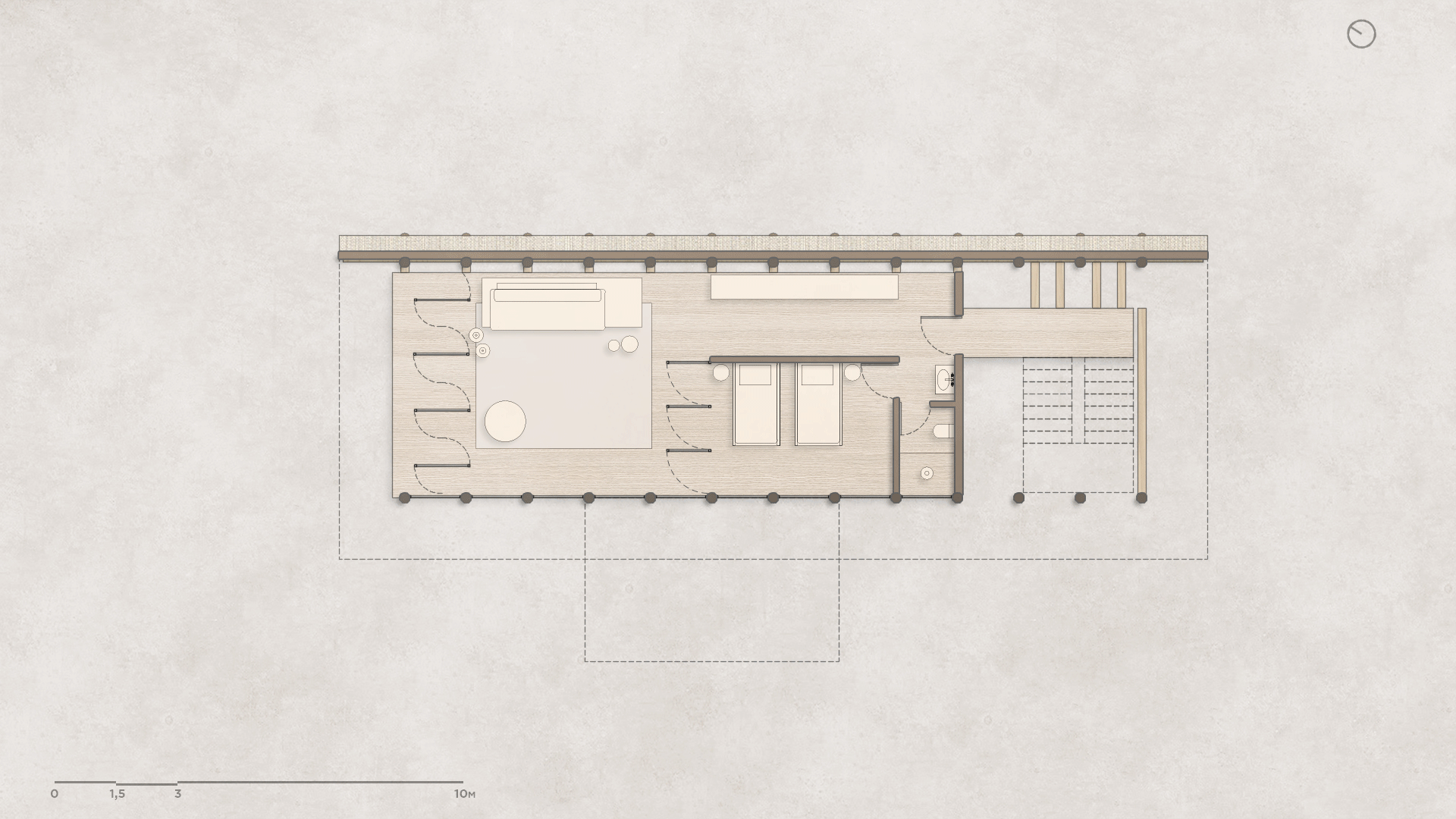PROJETO
HOTEL CARMEL ICARAIZINHO
LOCALIZAÇÃO
AMONTADA, CE, BRASIL
Localizada próximo a um pequeno vilarejo no litoral do Ceará, o Hotel Carmel Icaraizinho foi desenvolvido com o objetivo de transformar toda a experiência de visitar este pequeno paraíso, do banho de mar ao descanso, completamente única. Desde o início, Desde o início, o proprietário deixou claro o que ele imaginava para este espaço: um hotel de arquitetura singular, com espaços de tipologias diferentes que criem novas experiências.
O que marca este projeto e sua singularidade é a desconstrução do modelo tradicional de acomodações litorâneas, nada de grandes estruturas de circulação vertical e materiais rígidos como concreto, e sim, ambientes que tragam o melhor deste olimpo nordestino implementados na arquitetura. Já nos primeiros passos dentro do Hotel, a assimetria entre a parte externa e interna do ambiente te preparam para uma experiência inesquecível, enquanto a iluminação natural superior, que se torna assinatura do Hall de entrada, mostram o Oásis que te espera ao passar pelas portas.
A preocupação inicial do arquiteto responsável pelo projeto foi enquadrar a paisagem e torná-la uma extensão de toda a arquitetura do projeto, para isso, o projeto utilizou de técnicas vernaculares e sustentáveis, setorizando áreas e criando um operacional de hotelaria inovador. O Hotel Carmel Icaraizinho, mesmo com todas as suas visíveis referências de bioconstrução, ainda conta com Heliponto, academia e spa em espaços privilegiados. Estes espaços não são mera formalidade, a academia por exemplo, conta com equipamentos de ponta e convida à visita de hóspedes com a sua vista privilegiada para o mar.
Os materiais utilizados no desenvolvimento remetem a toda estética praiana da região, ressignificando o uso de palha e madeira em todo o projeto, enquanto o paisagismo cria ambientes jamais imaginados na região, unindo espécies de plantas nativas e tropicais. Nas paredes, a secular taipa de mão é resgatada, enquanto o teto de carnaúba e os pisos em madeira harmonizam o visual do hotel. Embora os principais insumos utilizados sejam estes, vale destacar a parte superior de áreas como o restaurante e a academia, que contam com um teto integrado à parte exterior, tornando quase impossível definir onde termina o gramado e começa o telhado destes espaços. O projeto é um marco para a construção e arquitetura sustentável, utilizando de matérias primas renováveis de forma inteligente, sem impactos ambientais ao seu entorno e sem abrir mão da sofisticação.
Já nas acomodações, diversas peças assinadas por Guilherme Torres, como as poltronas e as camas, são as responsáveis pelo conforto deste ambiente, enquanto a parede inclinada de palha mantém o tom regional do projeto. Outro destaque fica por conta da tipologia das diversas unidades disponíveis, divididas entre unidades inferiores com sala ampla e aberta, unidades superiores que possuem piscina e unidades premium: espaçosos duplex com vista privilegiada para o mar.
PROJECT
CARMEL ICARAIZINHO HOTEL
LOCATION
AMONTADA, CE, BRAZIL
Located near a small village on the coast of Ceará, the Hotel Carmel Icaraizinho was developed with the objective of making the whole experience of visiting this small paradise, from bathing in the sea to resting, completely unique. Since the beginning, the clients made clear what they imagined for this space: a hotel with unique architecture, with suites of different types and spaces that create new experiences.
What marks this project and its uniqueness is the deconstruction of the traditional model of coastal accommodations, no large structures of vertical circulation and rigid materials such as concrete, but environments that bring the best of this northeastern olimpo implemented in the architecture. Already in the first steps inside the entrance hall of the Hotel, the asymmetry between the external and internal part of the space prepare you for an unforgettable experience, while the upper central natural lighting, which becomes a signature of the entrance hall, shows the oasis that awaits you when you pass through the doors.
Guilherme Torres' initial concern was to frame the landscape and make it an extension of the entire architecture of the project, for this, the project used vernacular and sustainable techniques, sectoring areas and creating an innovative hotel operation. The Hotel Carmel Icaraizinho, even with all its visible references to bio-construction, still has a helipad, gym, and spa in privileged spaces. These spaces are not mere formality, the gym, for example, has state-of-the-art equipment and invites guests with its privileged view of the sea.
The materials used in the development refer to all the beach aesthetics of the region, resignifying the use of carnauba straw and rustic wood throughout the project, while the landscaping sectors paths and provides freshness to the spaces with a selection of tropical species. On the walls, the secular hand-made mud is rescued, while the carnauba wood ceiling and the rustic wood floors harmonize the look of the hotel. Although these are the main materials used, it is worth highlighting the upper part of areas such as the restaurant and the gym, which have a roof integrated to the outside, making it almost impossible to define where the lawn ends and the roof begins.
The project is a milestone for sustainable construction and architecture, using renewable raw materials in an intelligent way, without environmental impact on the surroundings and without giving up sophistication.
In the accommodations, several pieces signed by Guilherme Torres, such as armchairs and beds, are responsible for the comfort of these environments, while the slanted straw wall maintains the regional tone of the project. Another highlight is the typology of the several units available, divided between ground floor or suspended units with large and open living room, units on the top floor that have a pool and a view of the treetops, and special units that operate as spacious duplexes with a privileged view of the sea.
And the result was this, a project with unique high standard architecture without renouncing social responsibility and local labor.







































